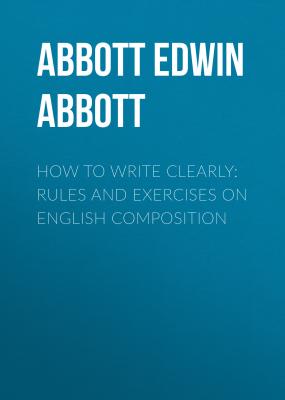How to Write Clearly: Rules and Exercises on English Composition. Abbott Edwin Abbott
Читать онлайн.| Название | How to Write Clearly: Rules and Exercises on English Composition |
|---|---|
| Автор произведения | Abbott Edwin Abbott |
| Жанр | Зарубежная старинная литература |
| Серия | |
| Издательство | Зарубежная старинная литература |
| Год выпуска | 0 |
| isbn |
Sometimes the addition of some intensifying word serves to emphasize. Thus, instead of "To effect this they used all devices," we can write "To effect this they used every conceivable device." So, if we want to emphasize fidelity in "The business will task your skill and fidelity," we can write "Not only your skill but also your fidelity." This, however, sometimes leads to exaggerations. See (2).
Sometimes antithesis gives emphasis, as in "You do not know this, but you shall know it." Where antithesis cannot be used, the emphasis must be expressed by turning the sentence, as "I will make you know it," or by some addition, as "You shall hereafter know it."
*19. Words should be as near as possible to the words with which they are grammatically connected.* See Paragraphs 20 to 29. For exceptions see 30.
*20. Adverbs should be placed next to the words they are intended to affect.* When unemphatic, adverbs come between the subject and the verb, or, if the tense is compound, between the parts of the compound tense: "He quickly left the room;" "He has quickly left the room;" but, when emphatic, after the verb: "He left, or has left, the room quickly."10 When such a sentence as the latter is followed by a present participle, there arises ambiguity. "I told him to go slowly, but he left the room quickly, dropping the purse on the floor." Does quickly here modify left or dropping? The remedy11 is, to give the adverb its unemphatic place, "He quickly left the room, dropping &c.," or else to avoid the participle, thus: "He quickly dropped the purse and left the room," or "He dropped the purse and quickly left the room."
*21. "Only" requires careful use. The strict12 rule is, that "only" should be placed before the word affected by it.*
The following is ambiguous:
"The heavens are not open to the faithful only at intervals."
The best rule is to avoid placing "only" between two emphatic words, and to avoid using "only" where "alone" can be used instead.
In strictness perhaps the three following sentences:
(1) He only beat three,
(2) He beat only three,
(3) He beat three only, ought to be explained, severally, thus:
(1) He did no more than beat, did not kill, three.
(2) He beat no more than three.
(3) He beat three, and that was all he did. (Here only modifies the whole of the sentence and depreciates the action.)
But the best authors sometimes transpose the word. "He only lived" ought to mean "he did not die or make any great sacrifice;" but "He only lived but till he was a man" (Macbeth, v. 8. 40) means "He lived only till he was a man." Compare also, "Who only hath immortality."
Only at the beginning of a statement = but. "I don't like to importune you, only I know you'll forgive me." Before an imperative it diminishes the favour asked: "Only listen to me." This use of only is mostly confined to letters.
Very often, only at the beginning of a sentence is used for alone: "Only ten came," "Only Cæsar approved." Alone is less ambiguous. The ambiguity of only is illustrated by such a sentence as, "Don't hesitate to bring a few friends of yours to shoot on my estate at any time. Only five (fifteen) came yesterday," which might mean, "I don't mind a few; only don't bring so many as fifteen;" or else "Don't hesitate to bring a few more; no more than five came yesterday." In conversation, ambiguity is prevented by emphasis; but in a letter, only thus used might cause unfortunate mistakes. Write "Yesterday only five came," if you mean "no more than five."
*22. When "not only" precedes "but also," see that each is followed by the same part of speech.*
"He not only gave me advice but also help" is wrong. Write "He gave me, not only advice, but also help." On the other hand, "He not only gave me a grammar, but also lent me a dictionary," is right. Take an instance. "He spoke not only forcibly but also tastefully (adverbs), and this too, not only before a small audience, but also in (prepositions) a large public meeting, and his speeches were not only successful, but also (adjective) worthy of success."
*23. "At least," "always," and other adverbial adjuncts, sometimes produce ambiguity.*
"I think you will find my Latin exercise, at all events, as good as my cousin's." Does this mean (1) "my Latin exercise, though not perhaps my other exercises;" or (2), "Though not very good, yet, at all events, as good as my cousin's"? Write for (1), "My Latin exercise, at all events, you will find &c." and for (2), "I think you will find my Latin exercise as good as my cousin's, at all events."
Конец ознакомительного фрагмента.
Текст предоставлен ООО «ЛитРес».
Прочитайте эту книгу целиком, купив полную легальную версию на ЛитРес.
Безопасно оплатить книгу можно банковской картой Visa, MasterCard, Maestro, со счета мобильного телефона, с платежного терминала, в салоне МТС или Связной, через PayPal, WebMoney, Яндекс.Деньги, QIWI Кошелек, бонусными картами или другим удобным Вам способом.
